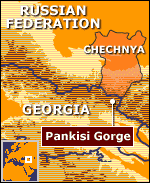Military hardware
Washington has already sent
at least six helicopters and unconfirmed US media reports say up to 200
special forces may be deployed.
The helicopters - which arrived
last autumn - are not equipped for carrying out air attacks, and will be
used only to transport men and equipment, officials say.
However, their deployment
is the first confirmed arrival of US military hardware in Georgia.
The US is stepping in because
of reports that fighters allied with Osama Bin Laden's al-Qaeda network
may have escaped to Georgia.
Speaking on a visit to Charlotte,
North Carolina, Mr Bush said: "As long as there is al-Qaeda influence anywhere
we will help the host countries rout 'em out and bring 'em to justice."
Advisory role
The US has been keen to
stress that any military aid to Georgia would have to be formally requested
and would be limited to training and equipment - no US troops would be
directly involved in fighting.
US forces will have the right,
however, to act in self-defence, said a Pentagon spokesman.
But Mr Ivanov says that a
US presence in Georgia will only increase tensions in the region, a criticism
Mr Powell was keen to dispel when he telephoned Mr Ivanov.
"They talked about the Georgian
situation. Ivanov talked about the Russian reaction. Powell talked about
how they're going to do training, and said it was in Russia's interests,"
a State Department spokesman told Reuters on condition of anonymity.
Lack of control
The focus of US attention
is the remote Pankisi Gorge, close to Georgia's border with the Russian
breakaway republic of Chechnya.
Washington is concerned that
the Georgian authorities are unable to control the security situation there.
The US and Russia both believe
that al-Qaeda suspects may be hiding in the gorge area, where militants
who operate in Chechnya are also believed to be based.
Correspondents say the Americans
are viewing the Georgian operation as a possible new front against global
terrorism.
As well as the operations
against al-Qaeda in Afghanistan, US troops are actively involved in efforts
by the Philippine Government to contain Muslim guerrillas that Washington
believes to have links with al-Qaeda.

|
